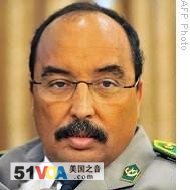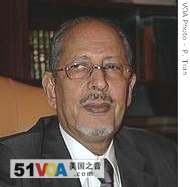Dakar
09 February 2009
Mauritania's military leaders are going ahead with plans for new elections in June, despite African Union sanctions meant to force the return of the toppled civilian government.
Mauritania's military government says the African Union's decision to impose sanctions ignores everything soldiers have done to improve the country since toppling the nation's first freely-elected leader last August.
The secretary-general of the ruling council, Colonel Ahmedou Bemba Ould Baye, says the path the military has chosen for Mauritania is irreversible. He says AU sanctions not only fail to recognize what he says are the "positive developments" since last year's coup, but also the military's willingness to work toward a return to constitutional order.
 |
| General Mohamed Ould Abdel Aziz ( file photo) |
Communications Minister Mohamed Ould Meine says the sanctions will not change anything in Mauritania because the government is committed to organizing new elections in June. He says it is pressing ahead with voter registration, and an extraordinary session of the National Assembly to nominate an independent electoral commission and to change the constitution to allow soldiers to run for office.
Pro-coup parliamentarian Sid Ahmed Ould Ahmed says he is shocked by the AU decision.
Ahmed says AU sanctions do not take into account the military's release of former President Abdallahi or the steps it is taking to resolve the crisis through new elections. As those were the main demands of the international community and the African Union, Ahmed says the decision to impose sanctions is clearly biased against Mauritania.
The African Union suspended Mauritania following the coup and refused to seat a delegation from the military government at last week's summit in Ethiopia.
 |
| Sidi Ould Cheikh Abdallahi (file photo) |
Mauritanian engineer Seyid Ould Mohamed Vadel fears the economic impact of the AU action.
Vadel says the suspension of international assistance following the coup has made life more difficult. He says further action will increase that hardship, especially without international investment.
Former-colonial-power France and the World Bank suspended most of their assistance following the coup. The United States is blocking $15 million in military cooperation, more than $4 million in peacekeeping training, and $3 million in development assistance.
African leaders are not refusing to negotiate with General Aziz. The African Union says its sanctions should be accompanied by African and international efforts to work with all Mauritanian parties toward the rapid return to constitutional order.
That starts with reinstating President Abdallahi. But General Aziz says returning the president to power would not serve the greater interests of the Mauritanian people. He believes changing the constitution to allow soldiers to run for office best reflects what he calls Mauritania's "new political and cultural reality."
General Aziz is widely expected to run for president in the June vote, but has not publicly announced his candidacy.